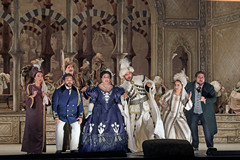| Opera Reviews | 25 April 2024 |
Divine madnessby Arlene Judith Klotzko |
|
| Rossini: L'Italiana in Algeri Metropolitan Opera October 2016 |
|
|
Fascination with the exotic, particularly anything Turkish, was very much in the air in the late 18th and early 19th centuries. Mozart wrote two rescue operas with western victims and Muslim oppressors, the fragment Zaide, and Die Entfűhrung aus dem Serail. He made Pasha Selim a benign and wise figure who pardoned the reunited lovers and allowed them to sail away. In contrast, Rossini’s Mustafà was a fool, albeit, in this production, an utterly lovable one. He was tricked by his strong willed and wily captive, Isabella, and her enslaved fiancé, Lindoro, into allowing their escape. They did this by bestowing upon Mustafà the honor of membership in the so-called Pappataci. In order to be a member in good standing he must do nothing but eat, drink and remain utterly oblivious to his surroundings. So he scarfed down prodigious amounts of pasta and wine as his captives sailed back to Italy. Bass-baritone Ildar Abdrazakov is a marvel of versatility. Just this season, he will be singing Figaro at the Met, Filippo II in Munich and London, and Prince Igor in Amsterdam. His portrayal of Mustafà as a tyrannized tyrant was pure farce. With his swagger, puffed out and VERY hairy chest (and back), and his range of dance moves reminiscent of 1930’s MGM musicals, he was a sight to behold. And there was nothing frightening about him at all. Having grown tired of his wife, Elvira (the lovely pure voiced Ying Fang), he longed for an Italian girl. When one washed up on his shores one day, he unwittingly validated the injunction to be careful what you wish for. In the sardonic words of Oscar Wilde, the worst thing that can happen to you is to get what you want. Abdrazakov was in fine vocal form, his big rolling bass easily handled Rossini’s difficult vocal writing. Elizabeth DeShong was originally scheduled to sing the role of Isabella, the Italian girl, but she cancelled the run, leaving mezzo soprano Marianna Pizzolato to make a double debut at the Met this season in two Rossini roles – first in this opera and then as Hedwig in Guillaume Tell. Here she convinced as Isabella in all of her complexity – strong, sincerely in love, and very crafty. Pizzolato dispatched her coloratura runs with elegance and agility with a voice rich in colors. Her rather matronly appearance made her even more imposing she was as a personality and driving force of the action. Mustafà with all of his power and prestige did not stand a chance. Also making his Met debut was tenor René Barbera as Lindoro. He sang with a lovely dark color and a blooming effortless top. His first act cavatina,“Languir per una bella,” sung with fine legato line and elegant phrasing, was a highlight of the evening. The excellent baritone, Nicola Alaimo, was a fun and funny Taddeo, the frustrated lover and first rate manipulator. He showed himself to be a brilliant comic actor in a stunning departure from the malevolent Paolo he sang in his Met debut opposite Hvorostovsky’s Simon Boccanegra, five years ago . Met stalwart Dwayne Croft, was back in fine form as Haly. Rihab Chaieb made a fine Met debut as Elivira’s friend, Zulma. James Levine, back at the Met in his first season as Music Director Emeritus, led a vibrant reading of Rossini’s marvelous score, which brimmed with rhythmic vitality and glowed with gorgeous melodies. The orchestra, as ever, was glorious. The male chorus, particularly their turn as pudgy-cheeked, pot-bellied eunuchs, was unforgettable. The 1973 Ponnelle production, originally starring Marilyn Horne, has worn well having gotten very little wear. Ms.Horne sang thirty seven performances. There was a revival in 2001 and another one in 2004, but nothing since then. It’s good to have it back.
|
|
| Text ©
Arlene Judith Klotzko Photos © Ken Howard / Metropolitan Opera |

 In 1813, at the ripe old age of twenty-one, Rossini, already a famous opera composer, wrote L’Italiana in Algeri for the Venetian Carnival. He wrote it very quickly – just how quickly is not known. It was such a resounding success that Rossini, in the orchestra pit, was pelted with flowers. He is said to have mused that having expected that the Venetians, after hearing his opera, would treat him as a lunatic, he was shocked to find them to be even more mad than he was. Especially in the midst of a brutalizing Presidential election, I found that immersion in Rossini’s sublime silliness to be the perfect antidote. And the Met audience was clearly captivated.
In 1813, at the ripe old age of twenty-one, Rossini, already a famous opera composer, wrote L’Italiana in Algeri for the Venetian Carnival. He wrote it very quickly – just how quickly is not known. It was such a resounding success that Rossini, in the orchestra pit, was pelted with flowers. He is said to have mused that having expected that the Venetians, after hearing his opera, would treat him as a lunatic, he was shocked to find them to be even more mad than he was. Especially in the midst of a brutalizing Presidential election, I found that immersion in Rossini’s sublime silliness to be the perfect antidote. And the Met audience was clearly captivated. 





